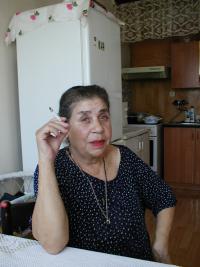My mom got a scrap of bread for the eight of u
Mrs. Marie Kormanova was born in 1937 in a Gypsy village called Dlhe over the Cirocha River in the Eastern Slovakia. Her dad as well as her grandpa ran a forge and were both known as very reputable citizens among both, the Romany people and the white people. Her father was also so called chairman of the village. Thank to their contacts among the white people the family was informed about potential upcoming danger and managed to find a hiding place on time in the woods. But when they returned back to their colony they got captured by Germans and the whole family was transported to Dubnice over the Vah River where were the Romany people gathering camp. Here they stayed and lived rough for six months. On April 8th 1945 the camp has been liberalized by the Soviet army. After the end of the war the Korman family moved to Prague where they live up to these days.

